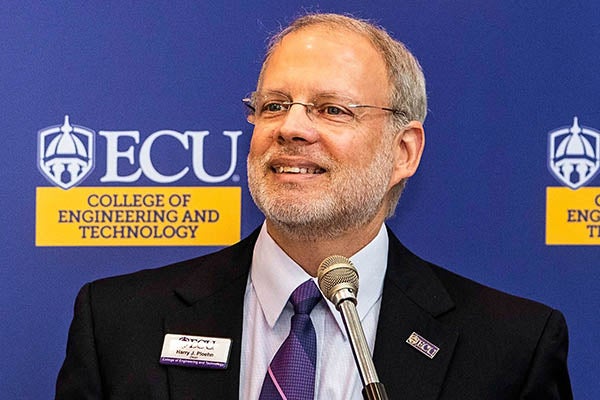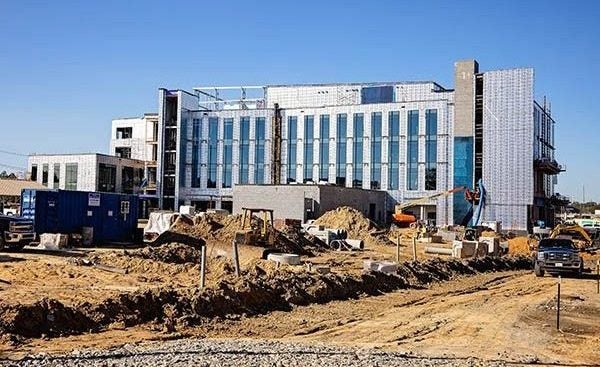BOOST FOR PHARMA TRAINING
ECU gets $1.9 million grant to create Eastern Region Pharma Center
East Carolina University has received a nearly $1.9 million grant from the Golden LEAF Foundation for the creation of a pharmaceutical manufacturing training center.
The Eastern Region Pharma Center (ERPC) is designed to teach students and pharmaceutical employees advanced manufacturing techniques and address a need for pharmaceutical workers with four-year college degrees in an area known as the BioPharma Crescent in eastern North Carolina. Pitt, Johnston, Wilson, Nash and Edgecombe counties are home to a variety of pharmaceutical companies, including Thermo Fisher Scientific, Mayne Pharma, Novo Nordisk, Grifols, Pfizer and CMP Pharma.
Pitt, Johnston, Wilson, Nash and Edgecombe community colleges are also part of the five-year project.
Within ECU, the project will initially draw on faculty expertise from the departments of engineering, technology systems and chemistry — and later from the colleges of business and education.
Dr. Harry Ploehn, dean of the College of Engineering and Technology and the project leader, said the center brings ECU and regional assets together to benefit eastern North Carolina.

Dr. Harry Ploehn, dean of the College of Engineering and Technology, is the leader of the Eastern Region Pharma Center project.
“With better coordination across the BioPharma Crescent counties, all of the partners — including industry, community colleges and ECU — will be more effective at recruiting students into lucrative, rewarding careers in the pharmaceutical industry, not to mention retaining our talent in the region,” he said. “This is truly a ‘grow local’ approach to provide the workforce our industry partners need to thrive here.”
Ploehn said the pharmaceutical industry already employs thousands in the region, and the demand for employees will continue to grow. He cited a December announcement by Thermo Fisher in Greenville to expand and add 500 jobs as well as a 2020 N.C. Biotechnology Center workforce study projecting aggressive growth of the pharmaceutical industry’s workforce needs, especially for those with graduate and bachelor’s degrees.
The ERPC and its community partners not only will provide trained professionals to fill those jobs, but also provide continuing education to help current employees advance their careers, allowing those workers to continue to live in eastern North Carolina, thus helping the area’s economy, Ploehn said.
“The key will be reaching those students in place so they can gain advanced skills without leaving their jobs, families and communities,” he said.
Among the highlights of the project:
- The center will create the Pharma Pathways Program in which ECU and community college staff will collaborate to help raise student awareness and provide academic programs, job training and career opportunities in the pharmaceutical industry. The program will be marketed throughout the region, including in military communities, and will provide career planning, scholarships and academic coaching from faculty, staff and industry representatives.
- The center will build and equip the Manufacturing Capability and Cybersecurity Complex (MCCC) in 4,500 square feet of lab space in ECU’s new Life Sciences and Biotechnology Building on Evans and 10th streets in Greenville on the Millennial Campus. The MCCC will be a hands-on, experiential education and training environment that will include two 1,200-square-foot teaching labs with new bioextraction and bioprocessing equipment, and a 1,900-square-foot high-bay lab housing a pilot-scale continuous manufacturing line.
- The center will add three new ECU faculty members and two academic advisors who will collaborate with community college counterparts to increase teaching capacity and develop new courses, enabling the colleges and ECU to expand enrollment in biotechnology and bioprocess manufacturing programs. The programs also aim to introduce pharmaceutical manufacturing topics to students in other disciplines such as chemistry and business that industry partners plan to recruit.
- The ERPC will expand on the N.C. Pharmaceutical Services Network (PSN@ECU), funded by a $1.1 million Golden LEAF grant to ECU in 2015, offering pharmaceutical manufacturing short courses, employee training and opportunities in which industry partners can test new ideas without disrupting their own manufacturing lines.
Ploehn said many partners worked hard in securing the grant, including Mark Phillips, vice president for statewide operations and executive director of the eastern region for the N.C. Biotechnology Center, and ECU Interim Chancellor Dr. Ron Mitchelson and Mike Van Scott, interim vice chancellor for the Division of Research, Economic Development and Engagement.

The Life Sciences and Biotechnology Building, shown in November and expected to open in time for the fall semester, will house a lab for the new Eastern Region Pharma Center.
“Growing employment opportunities for the citizens of eastern North Carolina and improving the economy in the region are at the core of ECU’s mission,“ said Van Scott. “Pharmaceutical manufacturing is critical to the economy of our region and state. ECU works closely with private and public partners to align efforts in support of this sector. By working together, we can scale opportunities for our students and faculty, increase career options in the region and meet the needs of our industry partners for growth and expansion.”
Phillips praised the teamwork that went into the project.
“This opportunity will assist in developing the longer-term pipeline of local talent into these organizations and serves as a phenomenal step in workforce training and talent development,” Phillips said. “ … There is a very wide range of opportunity in the pharmaceutical manufacturing arena, and this grant will help with the skills and training needs to start and grow a successful career within the pharmaceutical industry right in our own backyard.”
The Golden LEAF Foundation is a nonprofit organization established in 1999 to receive a portion of North Carolina’s funding from the 1998 Master Settlement Agreement with cigarette manufacturers. For 20 years, Golden LEAF has worked to increase economic opportunity in North Carolina’s rural and tobacco-dependent communities through grants, collaboration, innovation and stewardship. The foundation has funded more than 1,900 projects totaling more than $1 billion.
“Golden LEAF is pleased to support ECU’s regional approach to building a skilled biopharma workforce to meet industry demand,” said Scott T. Hamilton, Golden LEAF president and chief executive officer. “Local employers have identified an immediate need to fill hundreds of pharmaceutical manufacturing jobs, more than half of which require a four-year degree. When fully implemented, this program will help students living in the BioPharma Crescent of Nash, Edgecombe, Wilson, Johnston and Pitt counties earn a Bachelor of Science in industrial technology degree from ECU without leaving their home community and increase the ability of ECU to provide training to incumbent workers in those communities.”
